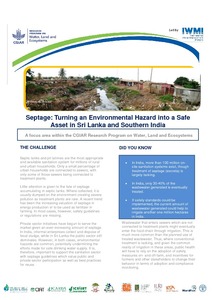Location
The International Water Management Institute (IWMI) is a non-profit, scientific research organization focusing on the sustainable use of water and land resources in developing countries. It is headquartered in Colombo, Sri Lanka, with regional offices across Asia and Africa. IWMI works in partnership with governments, civil society and the private sector to develop scalable agricultural water management solutions that have a real impact on poverty reduction, food security and ecosystem health. IWMI is a member of CGIAR, a global research partnership for a food-secure future.
IWMI’s Mission is to provide evidence-based solutions to sustainably manage water and land resources for food security, people’s livelihoods and the environment.
IWMI’s Vision, as reflected in the Strategy 2014-2018, is ‘a water-secure world’. IWMI targets water and land management challenges faced by poor communities in the developing countries, and through this contributes towards the achievement of the United Nations Millennium Development Goals (MDGs) of reducing poverty and hunger, and maintaining a sustainable environment. These are also the goals of CGIAR.
IWMI works through collaborative research with many partners in the North and South, and targets policymakers, development agencies, individual farmers and private sector organizations.
Resources
Displaying 181 - 185 of 959Shifting to hydrological/hydrographic boundaries: a comparative assessment of national policy implementation in the Zerafshan and Ferghana Valleys
In the literature on the implementation of national policies there is an assumption that these get implemented uniformly within one country. Here, with a focus on the implementation of national policy on shifting from administrative to hydrological/ hydrographic principles of water management in the Zerafshan Valley and the Ferghana Valley in Uzbekistan, this assumption is questioned. The case study demonstrates that national policies are resisted by lower-level bureaucrats, leading to diverse, even contradictory, outcomes of the same policy.
Septage: Turning an environmental hazard into a safe asset in Sri Lanka and Southern India
Review of literature on chronic kidney disease of unknown etiology (CKDu) in Sri Lanka
This manuscript undertakes a review of current published information (peer-reviewed and grey literature) on Chronic Kidney Disease of Unknown Etiology (CKDu) in Sri Lanka. It attempts to provide an overview of the possible environmentally-induced causal factors that have been implicated in the development of the disease, and identifies the gaps in research and recommends potential areas for future research.
Revitalizing canal irrigation: towards improving cost recovery
Cost recovery from irrigation in almost all the countries presents a dismal picture. Low cost recovery coupled with declining government finances has led to the deterioration of both the quality of the built infrastructure and institutions managing and governing such infrastructure. This has created a vicious circle of low cost recovery, poor maintenance of infrastructure, inadequate and unreliable water supply, inefficient and corrupt institutions, and unwillingness of the farmers to pay.
Review paper on ‘Garden Kits’ in Africa: lessons learned and the potential of improved water management
The purpose of this paper is to synthesize the available knowledge and lessons learned from past experiences in promoting kitchen or home gardens for food production, with a special emphasis on water management. The benefits of home gardens for better family nutrition, health status of children and mothers, and as an entry point for empowering women have been documented in some studies. However, there is very little specific evidence to confirm these benefits. The paper also reviews some of the water management practices and garden technologies used in home and market gardens.






